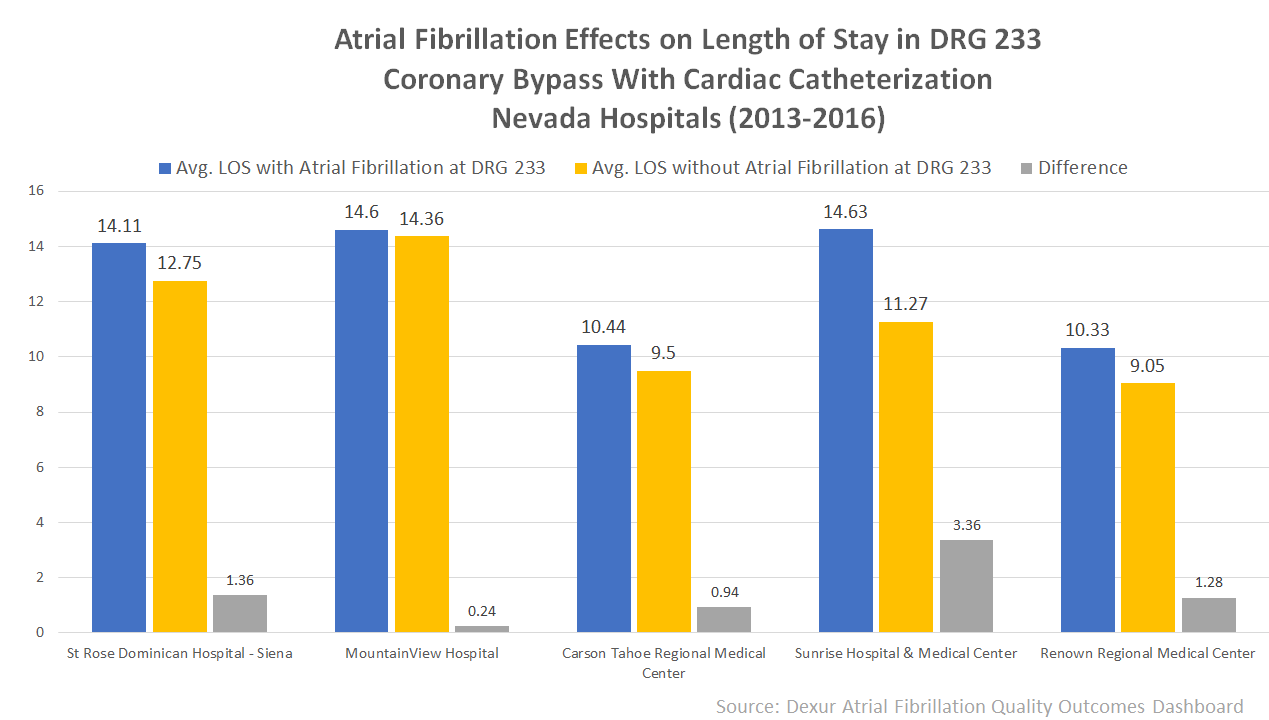Atrial Fibrillation Predicts Longer Length of Stay Among Coronary Bypass Patients in Nevada
In Atrial fibrillation (AFib)
Get Dexur’s Personalized Hospital Specific Presentation on Quality, Safety, Compliance & Education
By: James Pitt May. 15, 2018
Atrial fibrillation (AF) is a type of heart arrhythmia common in patients over 40. A 2016 study in Journal of Internal Medicine found that “the estimated lifetime risk of developing AF is one in four for men and women aged 40 years and above. Projected data from multiple population-based studies in the USA and Europe predict a two- to threefold increase in the number of AF patients by 2060.” Dexur has previously examined how AF affects readmission rates in patients with comorbid respiratory conditions.
A May 2017 study found that adding an atrial fibrillation treatment for patients already undergoing coronary bypass surgery (CABG) improved risk-adjusted survival. This procedure was performed in 17% of Medicare patients in 2013. To investigate the potential benefits of simultaneous AF and CABG treatment, Dexur analysts examined 2013-2016 Medicare data. The target population was inpatients who underwent CABG with cardiac catheterization, at hospitals in Nevada with over 5,000 Medicare-eligible inpatient discharges per year.

DRG 233 includes patients discharged after CABG with cardiac catheterization and major complications or comorbidities. For patients in this group, atrial fibrillation slightly but consistently increased the average length of stay. MountainView Hospital (Las Vegas) saw a marginal effect. On average, CABG with cardiac catheterization patients at this hospital stayed a quarter day longer if they had atrial fibrillation than if they did not. But another Las Vegas hospital, Sunrise Hospital, saw the largest effect. At Sunrise Hospital, atrial fibrillation increased the average length of stay by 3.36 days among these patients.
AF’s effect on length of stay was weaker in patients who did not have major complications or comorbidities (DRG 234).

Surprisingly, the large length of stay difference at Sunrise Hospital reversed from DRG 233 to DRG 234. This may indicate that Sunrise Hospital categorizes patients differently from other Nevada hospitals. Sunrise reported nearly twice as many DRG 233 as DRG 234 discharges.
DEXUR PRO MEMBERS GET ACCESS TO:
- DRG 233 total discharges, total discharges with atrial fibrillation, average length of stay (total, with, and without atrial fibrillation), and average difference in length of stay with and without atrial fibrillation, with state and national comparisons, for St Rose Dominican Hospital - Siena (Henderson, NV), Mountainview Hospital (Las Vegas, NV), Carson Tahoe Regional Medical Center (Carson City, NV), Sunrise Hospital & Medical Center (Las Vegas, NV), and Renown Regional Medical Center (Reno, NV).
- DRG 234 total discharges, total discharges with atrial fibrillation, average length of stay (total, with, and without atrial fibrillation), and average difference in length of stay with and without atrial fibrillation, with state and national comparisons, for all of the above hospitals.
ABOUT THE AUTHOR
